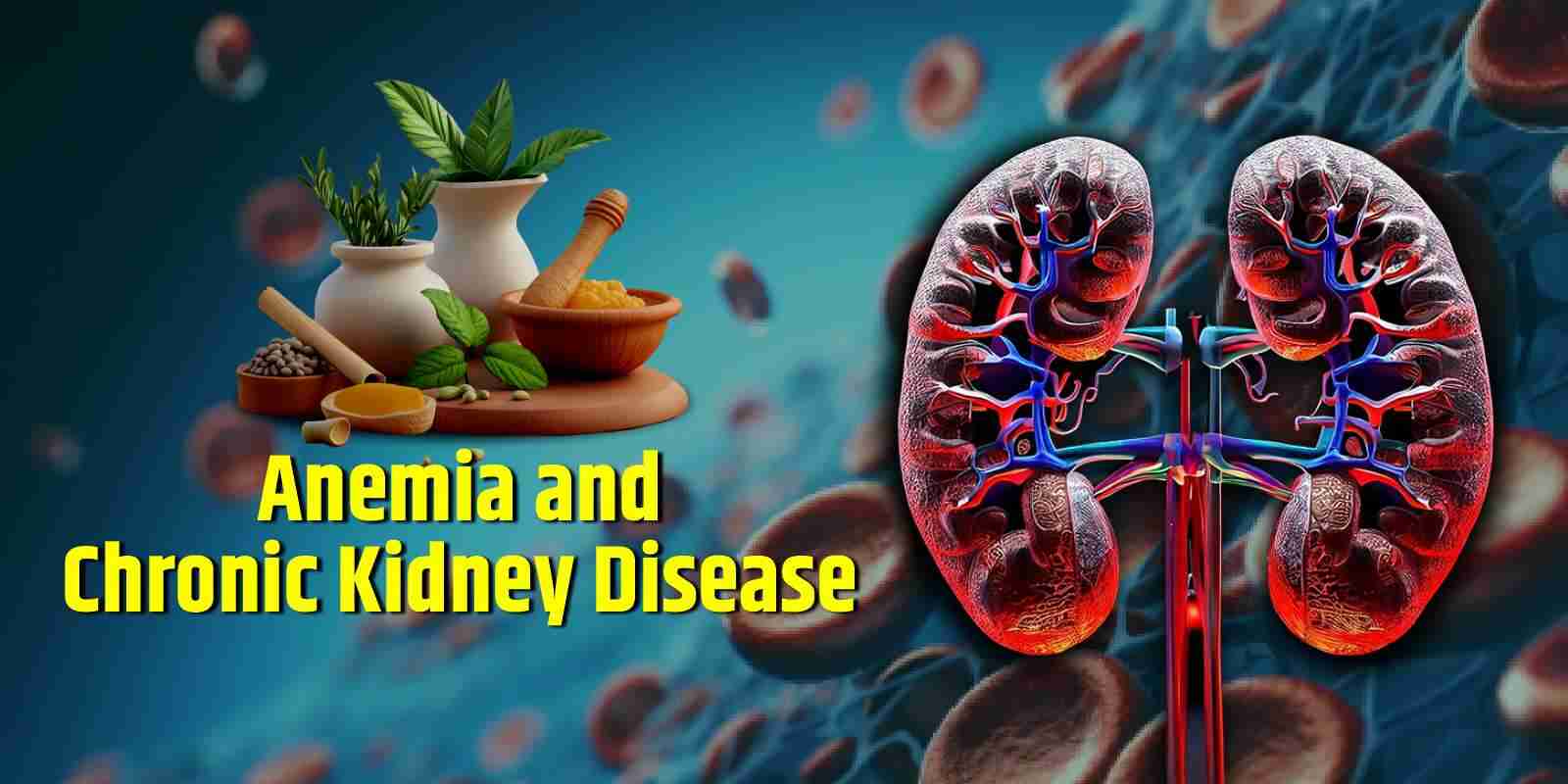
Chronic kidney disease (CKD) is the permanent loss of kidney function. The function of the kidney is to filter the excess waste from the body. When a person suffers from chronic kidney disease and reaches a dangerous level, this waste, electrolytes, and other related fluid is accumulated in the body.
Anemia is one such problem that occurs in people who suffers from chronic kidney disease. It begins in the early CKD stage when the kidney of the diseased person normally works to only 20 to 50 percent. Anemia and chronic kidney disease are directly proportional to each other, and anemia progresses when CKD progresses. People with completely failed kidneys have anemia. During the treatment of kidney failure, treatments such as dialysis and transplants, there might be a considerable loss of blood that can lead to anemia in chronic kidney disease patients. In this write-up, we will learn more about anemia, anemia in chronic kidney disease, and Ayurvedic treatment for chronic kidney disease.
Anemia is a health condition in which the body has fewer red blood cells as compared to the usual quantity. The red blood cells are responsible for the carriage of oxygen to the body tissues and organs. Red blood cells help the organs in utilizing the energy from food. When a person is anemic (one who suffers from anemia), his red blood cells do not carry much oxygen to the organs and tissues, in particular to the heart and the brain. It may cause the poor functioning of those organs and tissues. Anemia of chronic kidney disease treatment guidelines includes medical history, blood tests, supplements, and transfusion of red blood cells.
Anemia is prevalent in chronic kidney disease. When CKD is in its early stage, anemia begins to progress and gets worse with the worsening of the condition. People with problems such as kidney failure also have the problem of anemia. A damaged kidney cannot produce sufficient EPO. EPO stands for erythropoietin, also called hematopoietic or haemopoietin. It is a kind of protein secreted by the kidneys because of cellular hypoxia. It braces the production of red blood cells in the bone marrow. However, due to less production of EPO, the bone marrow produces fewer red blood cells, which results in anemia. Fewer red blood cells are the reason why the human body stays deprived of needed oxygen. One of the widespread and logical causes of anemia in humans is the loss of blood that occurs during dialysis or transplant.
Moreover, a low level of iron, folic acid, and vitamin B2 in food is also a significant cause of anemia in humans. This nutrition is considered vital for the making of hemoglobin. Some other causes of anemia in chronic kidney disease includes-
While a patient suffers from anemia, he notices specific changes in the functioning of his body. These changes can be noted as the symptoms of anemia. Some ubiquitous signs and symptoms associated with anemia in chronic kidney disease are as follows-
It is essential to take care of these symptoms so that they cannot progress further and do not lead to any further complications. If we do not consider the symptoms, it can lead to heart problems and may include issues like–
Anemia of chronic kidney disease causes a keen effect on patients. The impact of anemia is not bound to fatigue or dizziness, but it creates more adverse and deadly effects on health. It is associated with problems like cardiovascular complications and congestive heart failure. Patients with diabetes may face loss in the functioning of the kidneys due to anemia. Anemia causes the problem of hypoxia in patients that further stimulates the pathways that regulate the blood pressure in the human body. All these factors worsen the condition of proteinuria as it increases the level of protein in the tubules of the kidneys in diabetic patients. Also, patients with type 2 diabetes have anemia as an independent risk factor that can affect their kidney functioning. Anemia of chronic kidney disease can also progress diabetic neuropathy. Some of the other effects that anemia causes on the body are impaired life quality, mental acuity, etcetera.
The guidelines of Chronic kidney disease treatment in Ayurveda results in improved exercising quality, physical mobility, etcetera.
Condition of anemia in chronic kidney disease can be treated by the allopathic and Ayurvedic methods. Here, we will discuss both ways of treatment.
Allopathy consists of ESA therapy and Iron therapy.
Anemia is known as the Pandurog in Ayurveda. Ayurvedic medicine for chronic kidney disease and anemia initially focuses on the Dosha, which is imbalanced and due to which anemia in chronic kidney disease has taken place. Later, it works on the underlying causes of anemia and kills the symptoms and cause showing. Given below are some of the diet and lifestyle advice from the physician in the condition of anemia in chronic kidney disease-
That is how Ayurveda treats the problem of anemia of chronic kidney disease.
Disclaimer:- The purpose of the content on this page is not to substitute any professional medical advice but to only provide information to the reader. If the reader is a kidney patient, we recommend not making any diet or routine changes without consulting his/her doctor or dietitian. For appointments, call at our 24×7 helpline: +91-9821929797 or visit www.karmaayurvedahospital.com.
"Ayurveda is not just a system of medicine; it's a way of life. Connect with us to embrace a lifestyle that nurtures your body, mind, and soul."

Certificate no- AH-2023-0186
JAN 05,2023-JAN 04,2026